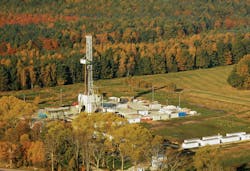I cannot think of a users group conference that I’ve attended in the past couple years that hasn’t referred to shale gas exploration as a “game changer”—both for the national economies so dependent otherwise on foreign oil and the companies supplying automation to the this and other process industries. There is excitement behind discussions of increasing self-sufficiency brought on by new gas discoveries.
IHS referred to the “shale gas revolution” in its recent analysis of pump market revenues in oil and gas, pointing to trends in North and South America. But it’s interesting also to get some perspective from Europe, and how its exploration activities and regulations are affecting pumps in the shale gas industry there.
Frost & Sullivan, which focuses its analysis on European markets, has done just that, taking a detailed view of pump market developments there, and offering a view of the political and economic trends behind shale market development.
Though political acceptance of shale gas exploration is growing in Europe, concerns about the environmental impact of fracturing are likely to hamper market growth, according to Frost & Sullivan. The pump market in the European shale gas industry reached revenues of $35.3 million last year, and the market analyst expects that to reach $47.7 million in 2017.
“Vast shale gas reserves across Europe and the economic benefits of shale gas exploration will encourage exploration,” said Niranjan Paul, industrial automation and process control research analyst for Frost & Sullivan. “However, the potential growth of pump manufacturers targeting the region’s shale gas industry will vary according to the country.”
The UK, Ukraine and Poland are at the forefront of shale gas production, trying to meet energy requirements and reduce dependency on Russian gas imports. But uncertain policies in other countries—such as France and the Netherlands, which have banned shale gas exploration because of concerns about possible earthquakes and polluted drinking water—could affect further market growth in the region.
Though Germany and the UK have issued permits, large-scale exploration is yet to begin because the feasibility of commercial shale gas production in Europe remains doubtful. ExxonMobil withdrew from Poland after the drilling of two gas wells failed to yield commercial opportunities. In Germany and Austria, oil and gas companies are required to conduct environmental impact studies for every shale gas project, escalating costs and significantly reducing the commercial viability of shale gas exploration.
But pump vendors are likely to still find some growth in Europe, with oil and gas companies such as Royal Dutch Shell and ConocoPhillips continuing exploration activities during the forecast period. Shell is likely to conduct seismic testing and drill test wells in Ukraine, and Chevron is looking to stake capital in shale gas exploration in Poland and Romania.
“In fact, proponents of the shale gas industry in Europe predict that increased exploration would be beneficial to countries affected by the slowdown, as it is expected to attract investments from major oil and gas companies, result in job creation, and provide significant tax revenue for governments,” Paul said. “To benefit from these opportunities and ensure market expansion, pump manufacturers must develop high-pressure pumps that will be suitable for applications in the shale gas industry.”
About the Author
Aaron Hand
Editor-in-Chief, ProFood World

Leaders relevant to this article:
